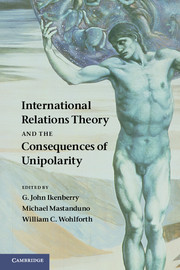Book contents
- Frontmatter
- Contents
- Figures
- Tables
- Notes on the contributors
- Notes on the editors
- 1 Introduction: unipolarity, state behavior, and systemic consequences
- 2 Unipolarity, status competition, and great power war
- 3 Legitimacy, hypocrisy, and the social structure of unipolarity: why being a unipole isn't all it's cracked up to be
- 4 Alliances in a unipolar world
- 5 System maker and privilege taker: US power and the international political economy
- 6 Free hand abroad, divide and rule at home
- 7 The liberal sources of American unipolarity
- 8 Unipolarity: a structural perspective
- 9 Unipolarity and nuclear weapons
- 10 From unipolarity to multipolarity: transition in sight?
- 11 Sell unipolarity? The future of an overvalued concept
- Index
- References
11 - Sell unipolarity? The future of an overvalued concept
Published online by Cambridge University Press: 05 June 2012
- Frontmatter
- Contents
- Figures
- Tables
- Notes on the contributors
- Notes on the editors
- 1 Introduction: unipolarity, state behavior, and systemic consequences
- 2 Unipolarity, status competition, and great power war
- 3 Legitimacy, hypocrisy, and the social structure of unipolarity: why being a unipole isn't all it's cracked up to be
- 4 Alliances in a unipolar world
- 5 System maker and privilege taker: US power and the international political economy
- 6 Free hand abroad, divide and rule at home
- 7 The liberal sources of American unipolarity
- 8 Unipolarity: a structural perspective
- 9 Unipolarity and nuclear weapons
- 10 From unipolarity to multipolarity: transition in sight?
- 11 Sell unipolarity? The future of an overvalued concept
- Index
- References
Summary
For at least the past thirty years, scholarship on international relations has been bewitched by a simple proposition: the polarity of the international system is a central cause of great power strategies and politics. The number of “poles” (dominant countries) in the system is like an invisible fence that shapes states as if they were dogs with electronic collars or a Skinner box that conditions national “rats.” States can choose to ignore the fence or box, but if they do, they must pay the consequences. The polarity of the international system as defined by the number of great powers – involving more than two (multipolarity), two (bipolarity), or one (unipolarity) – is expected to mold states and international politics in different predictable ways. The central place of polarity in IR theory is such that it is commonly assumed that the appropriate way to study the world is to examine the impact of polarity first and then move on to other lesser factors to mop up any unexplained variance.
Such a view, however, is problematic. What seems increasingly clear is that the role of polarity has been overstated or misunderstood or both. This is the unavoidable conclusion that emerges from the penetrating chapters in this volume that probe America's current dominant status (unipolarity) with the question “does the distribution of capabilities matter for patterns of international politics?” Despite the explicit claim that “unipolarity does have a profound impact on international politics” what is surprising is how ambiguous and relatively limited that influence is across the chapters.
- Type
- Chapter
- Information
- Publisher: Cambridge University PressPrint publication year: 2011
References
- 5
- Cited by



